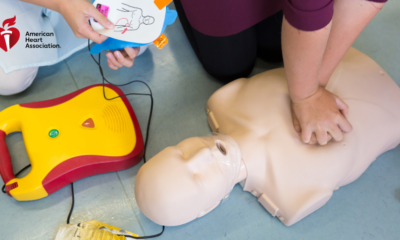arizona
Life-Saving Breakthrough: Medevac Choppers Now Carry Blood, But What About Ground Ambulances?

Time was critical as the medevac helicopter sped through the Arizona skies, bound for a local hospital. With a patient gravely injured from an ATV accident, flight paramedics worked urgently to stabilize him. The key to his survival was immediate access to blood.
BannerAir’s flight paramedics fought to control the patient’s significant blood loss. Without the life-saving blood available on board, the patient’s odds of survival were slim.
The availability of blood, both at the hospital and during transport, can be pivotal in emergency situations.
Unlike BannerAir, many emergency units in the United States do not carry blood on board. While BannerAir can administer blood transfusions en route, this practice is rare among Arizona’s ground ambulances.
“Data collected over the past decade shows that early transfusions significantly improve patient outcomes,” said Andrew Hasler, a BannerAir flight paramedic. “Immediate access to blood is crucial.”
Some states like Texas, Pennsylvania, and Alabama have already integrated blood into their ground ambulance services, and the impact on survival rates is evident.
In Arizona, ground units are not mandated to carry blood. Nonetheless, medevac helicopters have started to include blood in their equipment within the last 18 months.
BannerAir, which began its blood program in April 2023, has performed about 70 transfusions with notable success. “We’ve had patients who wouldn’t have survived without the blood transfusions provided before takeoff,” Hasler said.
A specialized cooler is required to transport blood, maintaining it at roughly 39 degrees Fahrenheit. “Every two days, our crews take a cooler to the blood bank, obtain two units of blood, and carry that cooler with them for two days,” Hasler explained.
The associated costs, training, and FDA regulations deter many ambulance programs in Arizona from carrying blood. Hasler also noted the difficulty in sourcing blood products.
Implementing BannerAir’s blood program took nearly 18 months. The initiative draws inspiration from military studies which found that trauma survival rates increased significantly for soldiers receiving blood within 34 minutes of injury.
“Timing is critical,” stressed Dr. Joe Sucher, trauma services medical director at HonorHealth Deer Valley. “Swift blood transfusions are essential for improving survival in emergency cases.”
The goal remains simple yet profound: saving lives.


















